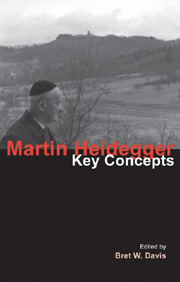Book contents
- Frontmatter
- Contents
- Contributors
- Acknowledgements
- Abbreviations
- Introduction: key concepts in Heidegger's thinking of being
- 1 Hermeneutics of facticity
- 2 Phenomenology: Heidegger after Husserl and the Greeks
- 3 Dasein as being-in-the-world
- 4 Care and authenticity
- 5 Being and time
- 6 The turn
- 7 Heidegger, National Socialism and the German People
- 8 Truth as alētheia and the clearing of beyng
- 9 The work of art
- 10 Ereignis: the event of appropriation
- 11 The history of being
- 12 Will and Gelassenheit
- 13 Ge-stell: enframing as the essence of technology
- 14 Language and poetry
- 15 The fourfold
- 16 Ontotheology and the question of god(s)
- 17 Heidegger on Christianity and divinity: a chronological compendium
- Chronology of Heidegger's life
- Bibliography
- Index
14 - Language and poetry
- Frontmatter
- Contents
- Contributors
- Acknowledgements
- Abbreviations
- Introduction: key concepts in Heidegger's thinking of being
- 1 Hermeneutics of facticity
- 2 Phenomenology: Heidegger after Husserl and the Greeks
- 3 Dasein as being-in-the-world
- 4 Care and authenticity
- 5 Being and time
- 6 The turn
- 7 Heidegger, National Socialism and the German People
- 8 Truth as alētheia and the clearing of beyng
- 9 The work of art
- 10 Ereignis: the event of appropriation
- 11 The history of being
- 12 Will and Gelassenheit
- 13 Ge-stell: enframing as the essence of technology
- 14 Language and poetry
- 15 The fourfold
- 16 Ontotheology and the question of god(s)
- 17 Heidegger on Christianity and divinity: a chronological compendium
- Chronology of Heidegger's life
- Bibliography
- Index
Summary
An orientation
The heart of Heidegger's thoughts on language are gathered in On the Way to Language, volume twelve of his Collected Edition (GA 12). English translations are distributed among three volumes. Peter D. Hertz translated most of On the Way to Language (as OWL) excepting the essay “Language”, which appeared in Poetry, Language, Thought, translated by Albert Hofstadter (PLT). (“The Way to Language” was re-translated by David Krell for the revised edition of Basic Writings [BW].) Language also arises as a key theme in other published works such as §34 of Being and Time (BT), “The Origin of the Work of Art” and “Letter on Humanism” (both in BW), as well as in many lecture courses and unpublished manuscripts.
Because I regard Heidegger as an unstinting phenomenologist who aims to disclose various phenomena as they show themselves from themselves (as opposed to how they conform to existing knowledge paradigms), I shall not recount these various explorations by way of a chronological textual analysis. Such a reading, while informative, sets aside Heidegger's philosophical project in favour of a historical one that focuses on an evolving “view”. This not only diverts attention from the phenomenon of “language”, but it also fails to heed Heidegger's own insistence: “The report of a new view about language matters little. Everything depends upon learning to dwell in the speaking of language” (PLT 210 = GA 12: 30).
- Type
- Chapter
- Information
- Martin HeideggerKey Concepts, pp. 195 - 207Publisher: Acumen PublishingPrint publication year: 2009



